I have no big claim to make about a great tradition of humour in Sindhi literature. Perhaps it may be the case with other Indian literature as well, since humour, as a distinctive form of creative art is relatively a modern phenomenon.
But this does not suggest that Sindhi literature is barren of elements of good humour. Sindhi prose is of recent origin of which I shall speak later. But Sindhi poetry is rich and ancient. The triumvirate of Sindhi classical poets – Shah, Sami and Sachal – can be counted as great poets by any standard and cane be enumerated in the galaxy of great Indian poets. Thought their poetry is more of mystical than worldly content their writings are sprinkled here and there with social satirical references.
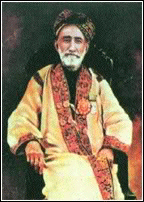
Mirza Qalich Beg
It is really a striking coincidence, that the first literary prose piece in modern Sindhi literature was humorous (The author remains unknown) “Wanhye ain Walhe ji Akhani” (The story of the rich and the poor man). It is a piece of lively musical alliteration, where every word invariably begins with ‘vao’ (w0. This is a fine specimen of the humour of words.
In this period many stalwarts rose on the literary scene, but prodigious among them was Mirza Kalich Beg, a highly placed civil servant in the Sindh government, endowed with an extraordinary bent of literary mind. He did not leave any subject under the sun untouched. He was a liberal, enlightened, and an unorthodox intellectual, who reacted sharply against the dead weight of the traditionally conservative class of Muslim priests, who stood as obstacles in the path of new awakening and social progress in the Muslim society. He poured scorn on them in satirical verses:
If piety means wrapping one’s body with a woolen shawl,
Then the Lamb surely would be placed at a higher pedestal.
If adorning a long beard meant symbol of priesthood,
He-goat would rank higher in the order of hierarchy.
Two more stalwarts Bherumal Maherchand and Parmanand Mewaram, contemporaries of Kalich, though inclined to an academic approach, occasionally dipped their pen for lighter moments. The former has written at least two short plays administering humourous treatment. One is about those crafty cloth-vendors, who used to load themselves with heavy cloth bundles like donkeys and roam the streets, defrauding the gullible simple women folk, through their tantalizing and wily tongues. And the other is about the tyranny of the hated social custom of dowry.
The next phase of literary efflorescence comes with the advent of two outstanding modern poets on the literary horizon of Sindhi, namely Kishinchand Bewas and Lekhraj Aziz.
‘Bewas’ wrote three short plays, the outstanding among them being “Porhe Jo Parno” (Wedlock of an Old Man) a biting satire on a lustful aged man, who chooses to take in wedlock a girl, young enough to be his granddaughter.
Poet Lekhraj ‘Aziz’ went a step further to try a full length play ‘Mr. Majnu’ in humourous style, perhaps the first of its kind in Sindhi. He treated the modern them of the young generation, turning to roadside Romeos who fancy themselves as immortal lovers, but burst out at the first prickle. It is a satire on the present day cinema, which is turning out such fake Romeos by the dozen.
Before I close the pre-partition period, I must not fail to make a mention of names of two outstanding dramatists who also made a considerable contribution to this genre of writing, those of Prof. M. U. Malkani and J. N. Nagrani. The former is known as the pioneer of modern day one-act plays in Sindhi and his contribution in that branch remains unsurpassed till date. Of the numerous plays he wrote, only tow have been treated in a humorous style – ‘Tea Party’ and ‘Ladies Club’. Both of them bear English titles even in the original. The first one is a beautiful satire on the imitative tendencies of the middle class college – going girls, who take pride in their eagerness to out-smart others and ultimately come to a sorry end of exposure by ridicule. The play was a roaring success on the stage and it has been repeated innumerable times. The other play is about the proneness to gossip amongst society women, who seek perverted pleasure at the cost of their own sex, by spinning juicy stories of scandalous nature in the cozy corners of the clubs. He has hit hard the so called forward looking and “liberated” women, who are quite modern in their make-up, but so utterly crippled in their mind.
Nagrani believes in creating fun for fun’s sake. Farce is his forte. In Sindhi, he is known for his ‘Gamto’ (fake) series. He has written more than a dozen farcical short plays, caricaturizing a doctor, a politician, an actor, an editor, a film producer, so on and so forth. His effort is to unmask those individuals in these noble professions, who by their greed, cunningness and sometimes out of ignorance prove to be not the benefactors of humanity at large, but a curse on the common folk. He exposes their clumsiness, ridicules them and evokes great laughter. He has brought out some of his plays in a book form entitled “Chowrangi”. His plays remained a craze on Sindhi stage for a long time.
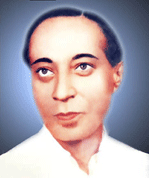
Parsram Zai
The great poet Parsram Zia was perhaps the first representative of such an unmatched jolly spirit of the Sindhi people. To provide a cheer to his people, he began to compose poems on day to day woes of the camp life in a lighter vein under pen names ‘Sipahia Ja Sukhana’ (Pearls of a Soldier) and ‘Sigretai Ja Soota’ (The puffs of a smoker). These humorous verses brought a little hope to the hopeless.
Even the rigours of the camp life he humorised in beautiful couplets to relieve the grimness of life:
Our shoes are worn out in the mountain terrain
We shall have to buy ourselves shoes made of iron
The Mother of ‘Pohu’ is cursing the heartless leaders
While washing the dirty clothes by the river side.
‘Zia’ was again perhaps the first one who introduced an element of political satire in Sindhi literature. In many of his poems, he has exposed the sheer cruelty of the power hungry politicians and their total lack of understanding of the human aspect of the tragedy of partition:
How generous are our leaders!
What an enjoyment they have plated for us!
If ‘Kher Sahib’ were to pass a night here,
He would make the dilapidated barrack his permanent abode.
The leaders were preaching the Gandhian morals and the poet cried out; about the black market:
Falsehood in business is moral
To adulterate milk for infants is moral
Let people go naked
To conceal cloth is moral
Anand Golani among the younger generation was in the initial years prolific. His style all through has been humour-oriented and even the most serious of his writings have a fine touch of humour. He has written over a hundred stories and his subjects have been varied. He can pick up any small incident from the roadside or a happening in the office room and humorise or satirise the oddities of life.
One of the collections of his short stories is entitled ‘Raniyoon’ (The Queens) perhaps because almost all main characters in the stories happen to be female. You will taste all hues of humour from the bitterest satire on the tragic aspect of the post-partition political situation (Khodro – Name of a refugee character) to the loudest category of humour (Tin . . . . Tin . . . . Tin) on the triviality of human nature.
Another young writer whose writings are predominantly humorous is Late Dass Talib (his real name being Gagan Bijlani). He started writing one-act-plays for stage and radio. His writings also fall in the category of broad humour, taken after J. N. Nagrani. But he imparts a little more refineness in his treatment in comparison to Nagrani, who created invariably comical characters and loud situations. ‘Talib’ wrote a novel entitled ‘Madari’ (Juggler) wherein he has treated the theme humourously.
Jeevan Gursahani an outstanding dramatist of Delhi has also touched the same aspect, yet in a subtler manner in his one-act play ‘Neelaam’ (The Auction).
Late Harikant Jethwani was yet another dramatist of repute, who has established himself as a good humourist. He had treated the above theme in one of his short plays entitled ‘Koee Achno Aahe’ (Someone is expected)
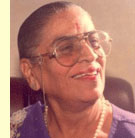
Popati Hiranandani
In the same context, Popati Hiranandani’s short story ‘Chhoondeende Bera. . ‘(Selecting the Berries) can be cites as bold attempt to expose the male chauvinism in a sharp satirical style. The boy goes on rejecting the girls on pointing to their facial defects – one being long nosed, the other with sunken cheeks and the third one with a flat chin and so on. And when ultimately the choice is forced on him, he gets an ugly girl. Everyone whispers in the other’s ear that he has wedded a goat.
Popati Hiranandani a versatile writer, excels everyone in humorous prose. She is forthright in not only ridiculing the male arrogance and flimsiness, but does not spare her own sex, for clumsiness and clownish exuberance and fickle mindedness of the female.
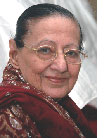
Sundri Uttamchandani
And yet there is another aspect of the subject of marriage about which Sundri Uttamchandani’s short story later on dramatized, ‘Amulha Manikan Jo Waapar’ (The Bargain for Priceless Jewels) is quite revealing. She has torn to pieces the superfluous pride of the middle class, who vie with each other, inflating themselves out of proportion and cut a sorry figure in the end. The girl’s mother is expecting people from the prospective bride-groom’s house. She wants to hoodwink them by arranging the articles in a fake way to appear as if she has a T.V. set, a telephone, a fridge etc. but the bluff is called by the touch of an innocent child and they appear to be hollow wooden boxes covered with silken covers to deceive the guests. Many diverse subjects are treated humorously in Sindhi literature.
Harikant’s ‘Makaan Khaali Aahe’ (House to let) has an interesting theme and has provided good comedy on stage. A landlord rejects every prospective applicant by putting absurd conditions to sublet a room and then there is the crowning irony. When ultimately he concedes to let out the room to a young man, it turns out that he has enticed the big-man’s daughter and was in search of a shelter.
Poet Moti Prakash’s multi-problem well-knit play ‘Parde-Agiyan-Parde-Puthiyan’ (Before the Curtain-Behind the Curtain) can be cited as an outstanding effort in this branch.
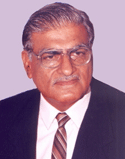
Lakhmi Khilani
Lakhimi Khilani and Teckchand Mast among the younger generation of writers have made a considerable contribution in the recent times to this field. Lakhimi’s pen is more mature and refined. Apart from a few humorous short stories, he has published two short novels of comparatively good taste and quality. “Hai Muhinjee Dil” (My Poor Heart) is combination of both humour of character and humour of situation. The story is woven round the jolly college hostel life, wherein the naughty students give themselves a field day, playing pranks on their classmates and the professors, who become targets of fun and tomfoolery. The practical jokes played with the fellow hosteliers and the professors sometimes border on cruelty or indecency, but that is, as it is.
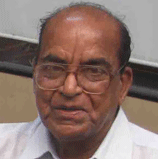
Teckchand Mmast
Teckchand Mast has published three books of his humorous writings of which tow are collections of skits and sketches, woven round, either some comical characters or day-to-day incidents picked up form real life that affords enough material to reveal the ugliness hidden behind social incongruities or political absurdities, we often come across. Some sketches are indeed enjoyable. His novelette ‘Shadia Ja Ladoon’ (The Allurement of Wedlock) is a light entertainer revolving round a queer character, who starts with fondness for wrestling, as a devotee of ‘Hanuman’ (God of Celibacy) and ends up into a hen-pecked husband, dancing at the tune of his wife.
Hari Himathani has also brought out his humorous sketches in a book form entitled ‘Bhanga Ja Ranga’ (The joys of Intoxication) which contains some very good character sketches that reveal much that is rotten in human character. At times he passes into unkind humour, but in certain cases it is innocent humour more particularly depicted in a lively sketch – ‘Grandpa’s Cot.’
Lastly I will mention two more poets from the younger generation of writers, who have tried their hand at humorous writing. They have also selected drama as medium of expression.
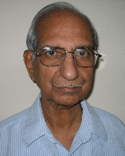
Vasudev Nirmal
Vasudev Nirmal has done a great deal in enriching Sindhi dramatic literature throught translation of good dramas from many other languages. He has given an original work ‘Ladey Ladee Aandi, Para . . . 1999’ and has written quite a few one act plays and skits more particularly in humorous tone. The very titles of his collections of one-act plays are revealing ‘Bora Achi Mirya’ (The Deaf Have Assembled) and ‘Sasu ri Sasu’, ‘Bina Deti-Leti Shaad’ . . . . He takes subjects from domestic life and creates pleasant humorous situations. His dialogue is pithy and entertaining. He has provided plays for children’s theatre providing knowledge to children, published as, ‘Amma Tokhe Khabar Aahe?’
Kamal another poet turned dramatist has in recent times written more than half a dozen humorous plays, that have been very successfully stages and won for him praise as a humourist. His well-known one act plays are “Shafa Khana” (The Dispensary), “Municipal Councillor” and “Neem-Hakim” (The Quack). The first play depicts a fake doctor, who fleeces the ignorant people, the second is a caricature of a person, who is madly aspiring to become a councilor and is ultimately cheated by some crafty so called vote catchers.
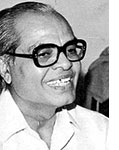
Gordhan Bharti
Gordhan Bharti is a versatile writer, who has tried his hand at every literary form and has established himself as an outstanding poet at that. His aptitude for humour is enormous. He has specialized in humorous marriage songs meant to be sung in solo or chorus and even dramatized them to be put on stage in action. Some of these humorous songs have been recorded (HMV) and are very popular at marriage parties and such other occasions for fun.
Rocho Khabi is fantastic in this realm. He is known as a readymade humour spinner, because he has written thousands of poems in lighter vein and remains unsurpassed at that. Though very often he has takes to loud humour but at times fine elements of wit and satire bristle out. His perception is so sharp that he can put any little happening or idea to good for laughter. Just one specimen:
There is queue for ration, queue for Bhashan
There is queue for voting, queue for shooting
There is queue of gluttons, queue of sycophants
There is queue of rapers, queue of cheaters
Before the doctor, there is the queue of the dead,
And before “Khabi” a queue of the debtors.
SINDHI POETRY is not lacking in serous touch of satire and humour. Krishin Rahi, Sugan Ahuja and Arjan Hassid have given some of the finest specimen of political satire. Rahi’s ‘Aaram Haraam Hai’ is a lavish satire on those who play cruel joke on the simple toiling masses by preaching hard work while rolling in luxuries themselves. He lashes:
Rest is sinful, work hard, work hard
This is an insult to me, an insult to you
And to all those country men
In whose life rest and sleep is already denied.
Published under International Cooperation with "Sindh Courier"



Comments